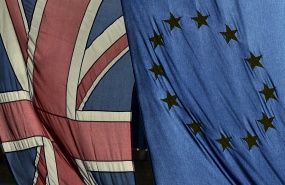Will Brexit polls prove to be accurate?
2015 general election shows that polls are not always to be trusted
- Brexit polls have fluctuated violently during recent weeks, with some putting Leave vote ahead
- Other countries such as Canada, Israel and Turkey have all experienced rogue opinion surveys
With Britain's historic EU referendum just days away, the impact of opinion polls is very much on everyone's minds. Can we trust them? Are they accurate? Some experts have actually questioned the use of polls in the run up to a vote.
Around a week ago, the Remain side of the referendum was highly confident of securing a victory, with the majority of polls swinging heavily in their favour. Since then there has been quite a significant shift, as the Leave vote pokes ahead in some of the surveys.
As reported by by the Financial Times, "whether such changes are due to genuine shifts in public opinion or to the failings of an industry in crisis is a subject of intense debate."
There has been quite a significant shift, as the Leave vote pokes ahead in some of the surveys
The most striking example of polls getting it wrong was just last year, with the shoch news that the Conservatives had won an absolute majority, despite suggestions from surveys that it would be a hung parliament once more.
ONLINE V TELEPHONE
According to FT, one of the main disparities lies in the difference between online and telephone polls.
"In telephone interviews, respondents are asked whether the UK should remain part of the EU or leave. They can say they don’t know or would prefer not to say, but since neither of these responses is explicitly stated as part of the question, there is an invisible nudge to lean one way or the other," reckons FT.
"Online, the alternative options have to be explicitly included in the poll as it appears on screen, meaning the tentative Remains and Leaves of the telephone poll often turn into more comfortable Don’t Knows or PNTSs."
Online polls appear to have been a dead heat for most of 2016, whereas telephone polls show that Remain has maintained a solid lead for most of the year.
Perhaps this difference comes with the more pressurised situation of the telephone questionnaire, where people are more likely to stick with the status quo when they are asked to make a firm decision while sitting on the fence.
Another problem that the accuracy of polls faces is whether the people who respond to them actually get up off their sofas and vote. The turnout of the referendum could hold the key to which side comes out on top.
"Some pollsters only include answers from respondents who declare themselves certain to vote in the referendum, others weight the responses according to where respondents place themselves on a likelihood scale from 1 to 10," say the FT.
Some suggest that bookmakers' odds is a more accurate way to predict the outcome of the referendum, assuming that when people risk their money on something that that makes them more motivated to win.
However, a lot of the money placed at the bookmakers is actually placed on the premise of polls. Based on the odds of mainstream bookmakers in the UK during the last general election, the Conservatives didn't actually manage to take over Labour convincingly until days before the event.
In short, Brexit polls are likely to be accurate, but it's impossible to tell for absolute certain whether the polls will align with the result on the day.


